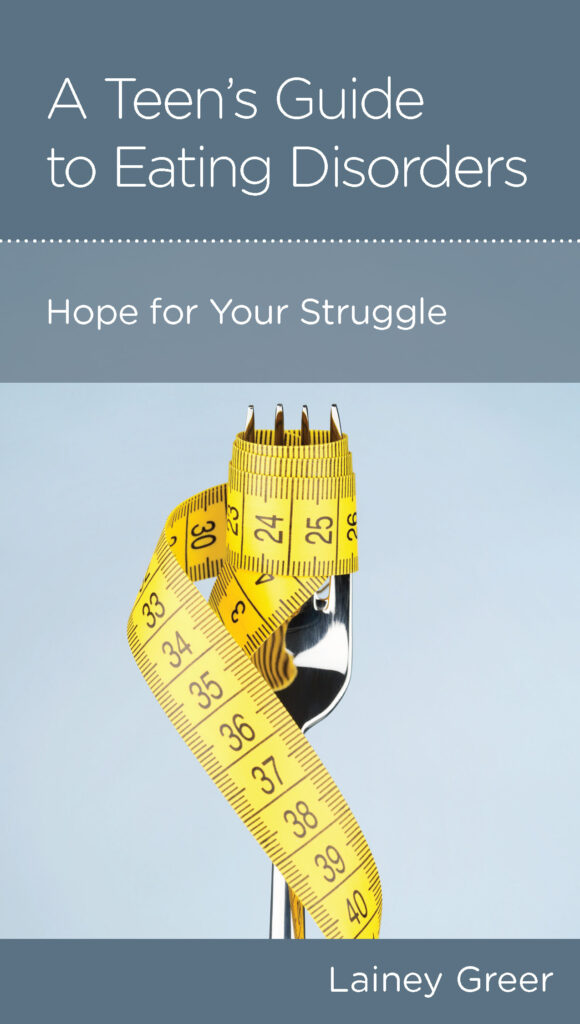Nearly 100 percent of teens use one or more social media platforms, despite over 40 percent admitting that the constant onslaught on images often leads to a negative view of their own bodies. Combine this phenomenon with the heightened rates of anxiety and depression among teens, and you’ll find that much of the groundwork is laid for an eating disorder.[1]
Negative body image is a key component in eating disorders. When 3 in 4 girls and 2 in 4 guys want to change something about their bodies, guarding teens from negative body image influences is essential. Because the world is screaming messages to young people about the way they should look, if parents, grandparents, and churches aren’t talking to teens and even young children about their bodies, we’re falling behind in building them up with the truth.
Teens face multiple factors that could lead to an eating disorder—friends and family, social media and television, genetics and puberty—so it’s critical to equip them with a biblical view of the body and how it connects to their daily lives. Without God’s Word driving their body thoughts, their internal struggles often manifest in outward disorders.[2]
Trusting God with Your Struggle
If you’re a teen wrestling with an eating disorder—or even just struggling with food, body image, or comparison—you’re not alone. It can be a battle that many attempt to hide with smiles, oversized clothes, social media filters, or excuses like “I’m not hungry” or “I need to go to the gym.” God sees and cares about your struggles.
Eating disorders are real struggles with a physical and spiritual impact. They can look like anorexia, bingeing, purging, compulsive exercising, or obsession with muscle building (bigorexia). But no matter how the struggle shows up, at the root is a deeper heart issue of wanting control, acceptance, or to meet an impossible standard.
Genesis 1:27 reminds us that we are made in God’s image as soul and body human beings. That means your worth isn’t tied to your waistline, your weight, or your muscle mass. Our culture says that beauty is everything, but God’s Word says, “People look at the outward appearance, but the Lord looks at the heart” (1 Samuel 16:7). And he wants us to believe the truths in his Word over the lies in our head and from the world.
Eating disorders often come with lies like:
- If I’m not this weight, I’m not good enough.
- If I looked like her, I’d be happy.
- If I control my food, maybe I won’t feel so anxious.
- If I can’t build more muscle, my friends will reject me.
But God’s Word cuts through those lies with truth:
- I am fearfully and wonderfully made (Psalm 139:14).
- My body is a temple of the Holy Spirit (1 Corinthians 6:19).
- I have freedom with Jesus, not shame (Galatians 5:1).
- I can think thoughts that are lovely, true, right, and pure (Philippians 4:8).
Maybe you’ve been struggling for a while and are tired. Maybe no one knows what you’re going through, not your parents, your friends, or church leaders. But Jesus does, and he understands your battle because faced the same temptations we do (Hebrews 4:14–16). He doesn’t turn away because you’re hurting. He draws near and wants you to come to him as you are, trusting him with your struggle (Matthew 11:28).
What Can You Do?
- Talk to someone. Hiding in the dark makes the struggle stronger. Bring it into the light with someone you trust like a parent, a youth leader, a counselor.
- Fill your mind with truth. Replace the world’s lies with God’s Word. Try memorizing verses that remind you of your identity in Christ, like those mentioned above.
- Pray honestly. God wants you to express your fears, your anger, your shame to him. He can handle everything you’re fearful of sharing.
- Seek help. There’s no shame in needing support. Talking to a Christian friend, leader, or counselor before things get worse is wise and honors God.
Things may not feel hopeful right now, and that’s okay. But hope isn’t something you have to work up on your own, it’s a promise you can rest in. Jesus is the source of our hope, and we can trust his promise to be with us always (Matthew 28:20).
If you’re struggling with body image, food, or exercise, know that you are not too broken, or too messy for the One who made you, knows you, and loves you.
There’s hope for your struggle. His name is Jesus.
[1] “Supporting Teens in Navigating Body Image and Self-Esteem Challenges”, June 24, 20204, https://www.cambermentalhealth.org/2024/06/24/supporting-teens-body-image/.
“CDC Data and Statistics on Children’s Mental Health”, June 5, 2025, https://www.cdc.gov/children-mental-health/data-research/index.html.
[2] An T. Vuong, Hannah K. Jarman, Jo R. Doley, and Siân A. McLean. “Social Media Use and Body Dissatisfaction in Adolescents: The Moderating Role of Thin- and Muscular-Ideal Internalisation” International Journal of Environmental Research and Public Health 18, no. 24: 13222. 2021. https://doi.org/10.3390/ijerph182413222.
A Teen’s Guide to Eating Disorders
Teenagers today face many of the same challenges their parents faced. But they also face new challenges from constant access to social media and the accompanying pressure to be perfect from celebrity culture. In response, many teens find themselves struggling with an eating disorder. How do you break out of something so difficult and so harmful?






